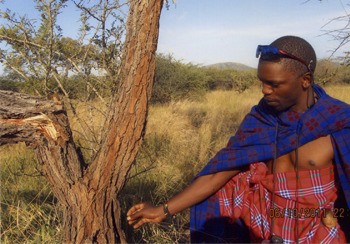On night, while camping, Joe Shultz felt something brush the side of his tent. In the morning he learned that the campsite’s midnight visitor had been a hyena.
“It was amazing,” he said about this experience and others on his trip to Tanzania. “You could hear lions coughing a hundred feet away as you were sleeping.”
Close encounters with wildlife were just the beginning of several life-changing events that Schultz experienced last summer on a trip to Africa. One of those moments was meeting Johnson Sadock, who Schultz describes as the most remarkable man he has ever met.
“I was with him for three weeks,” he said. “He lives and breathes what he is doing.”
Johnson, a safari guide from Tanzania, Africa has spent five years helping orphans, runaways and other poor children in Moshi, an impoverished village in the shadow of Mount Kilimanjaro. He will speak at the Mullis Center, 589 Nash Street, Thursday, Feb. 23, 7-9 p.m., and share pictures and stories.
Shultz, of Friday Harbor, went to Tanzania because his friend was leading a student group from the Drew School in San Francisco with an organization called Foot2Afrika, co-founded by Johnson, and focused on placing volunteers from the United States, Europe, Australia and Asia into local African groups in need of help.
Foot2Afrika also provides advice and financial support to a network for more than 15 orphanages, homes for street youth, schools, women’s centers and environmental organizations. The organization is supported by income from Johnson’s safari business and the hostel he operates for volunteers.
So Shultz found himself with eight kids, and three teachers – all helping to renovate a school in Moshi, planting more than 100 mango and various shade trees and reading books with children at an orphanage. At the school, Schultz learned that at least 50 percent of every child had lost one parent to AIDS.
One day, the whole group visited the 12 poorest families in the area. They hauled 20 pounds of rice, mosquito nets, lamps and foam mattresses up small dirt roads to small, remote huts.
“It blew me out of the water,” said Shultz about that experience. “Things can seem hard here, but we really have no idea … it was just overwhelming.”
‘Poverty and what can I do about it’
Johnson earned a bachelor’s degree in science and then conducted research on mountain gorillas in Uganda, adolescent male elephants in Tanzania’s national parks and other endangered species.
Later he became a safari driver, first in Kenya, then in Tanzania. With his training in wildlife biology and animal behavior, he ultimately became the head guide trainer for a major eco-tourism operator. His work brought into contact with impoverished communities in Tanzania. And during safaris, tourists would often ask questions about kids begging for money or food and water. When tourists asked, why are the kids so poor, Johnson had no answer. And he started thinking, why is there so much poverty and what can I do about it.
That’s when he got the idea to create a program where westerners can visit Tanzania as safari tourists and volunteers for impoverished villages.
He said problems in Africa boil down to two issues; money and lack of education. When he was a boy living in a village he thought he might never leave that area, but a missionary family from Norway visited his school one day and they kept in touch with Johnson over the years. The family pushed Johnson to get an education and paid for his extended education. Now he wants to help other youths achieve the same goal.
Johnson’s motivation to visit the U.S. is to raise $48,000 to buy property to use for a Trade School in Moshi. His itinerary includes New York, Boston, San Francisco and Friday Harbor.
This is his first visit and in the first few days of his trip he raised over $1,500, in part by selling crafts made by the women and children in Moshi.
He said its important to raise funds because his only income comes from his safari guide work. He’s also looking for potential volunteers and people to fundraise. But above all he wants to make a personal connection with people in the U.S.
Shultz hopes that the upcoming event at the Mullis Center will inspire others to take a “volunteer” vacation to Tanzania.
His wife, Marjorie Fielding, is going on the same trip with the Drew School this summer. Shultz would go again, but someone has to stay home to run the couple’s truffle’s farm.
“Johnson opened up Tanzania in a way that I would never have gotten from someone else,” Shultz said. “It was like blossoms on the vine. He’s a nicer guy than you could ever meet in your life. We need more guys like that.”
Volunteers to Tanzania have to pay airfare, a volunteer permit for $200 and $12 to $15 per night at Johnson’s hostel, which includes breakfast and dinner.
For more info, visit foot2afrika.com or call Joe Shultz at 378-2929.



